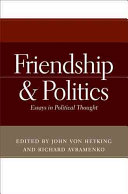
Friendship and Politics: Essays in Political Thought PDF
368 Pages·2008·5.6289 MB·other
Most books are stored in the elastic cloud where traffic is expensive. For this reason, we have a limit on daily download.
Preview Friendship and Politics: Essays in Political Thought
Description:
Throughout the history of Western political philosophy, the idea of friendship has occupied a central place in the conversation. It is only in the context of the modern era that friendship has lost its prominence. By retrieving the concept of friendship for philosophical investigation, these essays invite readers to consider how our political principles become manifest in our private lives. They provide a timely corrective to contemporary confusion plaguing this central experience of our public and our private life. This volume assembles essays by well-known scholars who address contemporary concerns about community in the context of philosophical ideas about friendship. Part One includes essays on ancient philosophers including Plato, Aristotle, and Cicero. Part Two considers treatments of friendship by Christian thinkers such as Augustine, Aquinas, Luther, and Calvin, and Part Three continues with Thomas Hobbes, Montaigne, the American founders, and de Tocqueville. The volume concludes with two essays that address the postmodern emphasis on fragmentation and the dynamics of power within the modern state. "This is an outstanding anthology in every respect. Friendship and Politics brings into focus a topic that lies at the heart of the political, even while it has not always garnered the attention it deserves. Friendship, the contributors demonstrate, is an indispensable concept for the analysis of the bonds of political association. The case is most convincingly made by drawing upon the analyses of the greatest thinkers within the history of political thought." --David Walsh, Catholic University of America "Contemporary political theory assumes that friendship is a private affair, a human relationship that should be quarantined from explorations of politics. The essays in this volume--uniformly excellent, by our best political thinkers--put those assumptions to the test. Together, the essays point to a conception of politics that necessarily includes the highest and best form of human companionship as a necessary means, and even worthwhile end, of the good life. They consider friendship to be a good and at times a challenge that should properly be the concern of political thought and political action. This is an indispensable volume on the inescapable relationship between friendship and politics." --Patrick J. Deneen, Georgetown University
See more
The list of books you might like
Most books are stored in the elastic cloud where traffic is expensive. For this reason, we have a limit on daily download.
